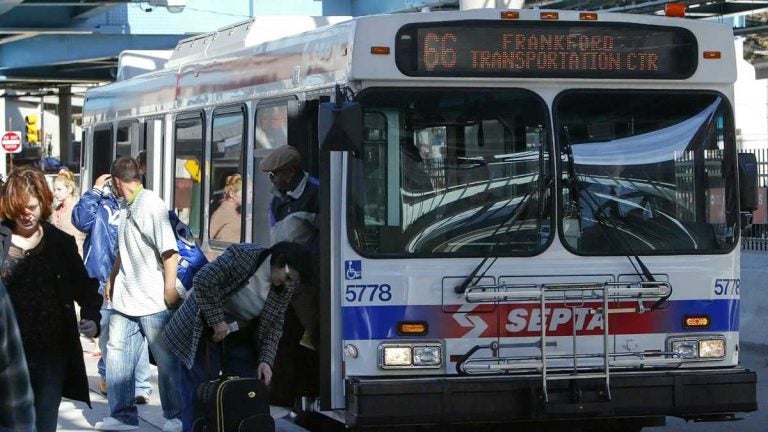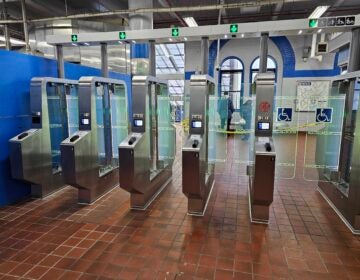Study: SEPTA transfer fees hit low-wage commuters the hardest
Commuters without a lot of cash to spare get hit hardest by SEPTA’s transfer fees, according to new research from the Pew Charitable Trusts.

Commuters are shown exiting a SEPTA bus. (AP Photo/Joseph Kaczmarek, file)
This article originally appeared on PlanPhilly.
—
Commuters without a lot of cash to spare get hit hardest by SEPTA’s transfer fees, according to new research from the Pew Charitable Trusts.
Straphangers using the SEPTA Key card’s Travel Wallet get charged $3 for a ride that includes a transfer — the second-highest single-trip fare among peer cities after Washington, according to the report.
But riders who rely on cash — perhaps because they can’t afford to pre-load money onto Key cards — must spend more to get where they need to go. One transfer for these cash riders costs $5 because they’re forced to pay $2.50 each time they board a new vehicle, unless they are switching subway lines at City Hall. That’s free.
“The base fare for SEPTA’s buses, subways and trolleys is low compared to other cities, but the transfer fees are relatively high for riders who don’t use weekly or monthly passes,” said Seth Budick, who authored the report.
That’s problematic, in part because commuters with lower-wage jobs are more likely to need transfers to get to jobs in suburban or outlying areas than white-collar riders who tend to work in and around Center City.
The report found that transfer fees extract the highest toll on residents of certain sections of West and North Philadelphia, as well as along the Kensington Avenue corridor. Those areas have lower rates of car ownership and higher poverty rates.
“That kind of exacerbates things,” said .
The findings come as SEPTA begins to consider the future of transfer fees. Spokesman Andrew Busch said the agency may completely eliminate them.
It’s a decision that would create a roughly $14 million budget hole. That translates to roughly 3% of SEPTA’s annual revenue.
“It’s come up over the years. This is definitely the furthest down the road we’ve been in looking at it,” said Busch, adding that SEPTA brass will consider the impact transfer fees have on low-income riders — including those commuting to work – during the deliberation process.
Transfer fees could disappear next July if an agency proposal is backed by its board following public hearings, said Busch.
SEPTA has charged for transfers since the 1970s.
WHYY is your source for fact-based, in-depth journalism and information. As a nonprofit organization, we rely on financial support from readers like you. Please give today.



 WHYY is one of 22 news organizations producing Broke in Philly, a collaborative reporting project on solutions to poverty and the city’s push towards economic justice. Follow us at @BrokeInPhilly.
WHYY is one of 22 news organizations producing Broke in Philly, a collaborative reporting project on solutions to poverty and the city’s push towards economic justice. Follow us at @BrokeInPhilly.
